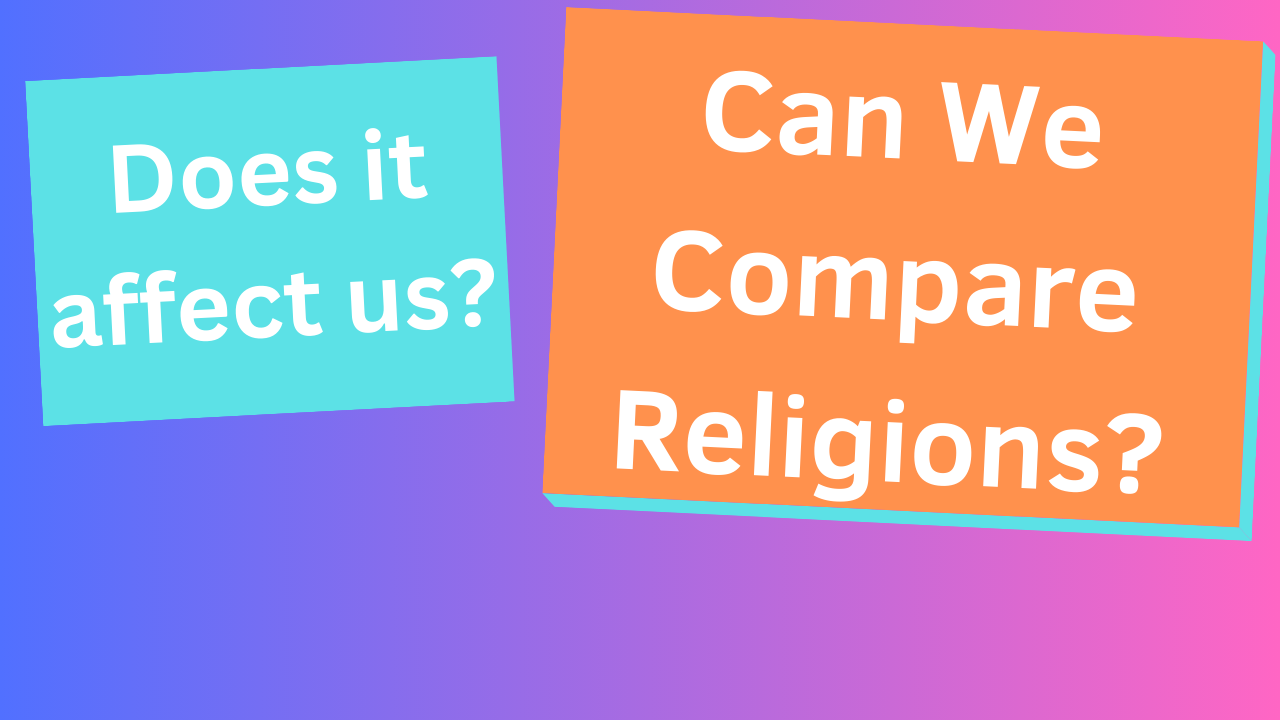04/10/2024 – Can We Compare Religions?

Can we compare religions? In what ways, if any, would that affect our own views? This is going to be an interesting conversation and this is also TenOnReligion.
Hey peeps, it’s Dr. B. with TenOnReligion. If you like religion and philosophy content one thing I really need you to do is to smash that sub button because it really helps out the channel. The transcripts are available at TenOnReligion.com and new episodes are posted about every two weeks, around noon, U.S. Pacific time, so drop me some views.
So, can we compare religions? In what ways can we understand religions different from our own? We’re going to take a look at five different subtopics to help answer these questions. First, internal vs. external comparing. Second, five common categories in comparing. Third, how hermeneutics and language affects comparing. Fourth, the purposes or motivations for comparing religions. And fifth and perhaps most important, the impact on one’s current religious adherence. Let’s get started.
First, internal vs. external comparing, or sometimes called the confessional and meta-confessional comparison. Internal or confessional comparison happens within a specific religious tradition because religions are like large umbrellas with many people underneath them. There are many people that identify as Christian but believe and practice many different things. Same goes for Islam, Hinduism, Buddhism and so forth. So instead of a Roman Catholic rejecting a Methodist, they could try to learn about their differences and then make an effort to better understanding Christianity through those differences. External comparing, or meta-confessional comparison, is a similar process, but without the constraints of a particular religious tradition. It can even be transreligious, with the possibility of identifying with more than one religion to begin with. The basic process is that a person investigates something or someone that is related to their own religion in another religion, like prayer in Judaism vs. meditation in Buddhism, or like Jesus’ mother Mary in the New Testament gospels vs. Mary in the Qur’an. Through the effort of this investigation like reading texts, studying history, or learning new interpretations, one can deepen, enrich, or even critique the teachings or practices of one’s own religion.
Second, five common categories in comparing which have been used for many decades in the academic field of religion. The first is exclusivism which often results in an apologetical attitude towards other religions. Essentially, “my way or the highway” type of attitude. The second is particularism, which focuses on the perspectival nature of religion. This is drawn largely from the work of George Lindbeck and Mark Heim. The third is inclusivism in two parts: closed and open. In general, inclusivism is the idea that one’s tradition is true and all others are to some degree “on the way” towards “my” tradition. Closed inclusivism emphasizes the final truth of one’s home tradition, represented by figures such as Karl Rahner and Gavin D’Costa. Open inclusivism only emphasizes the central teachings of the home tradition as a minimal norm. A good example of this view is Jacques Dupuis. The fourth category is pluralism, where there are some neutral or common criteria to judge other religions. This can be found in the work of John Hick, Paul Knitter, or more recently, Perry Schmidt-Leukal. The fifth category of post-colonialism is the idea of critiquing power relationships in understanding religion, such as identity vs. diversity, or the problem of essentializing religion. Who gets to say what “Hinduism” is or who “owns” Christianity? Who gets to decide and on what basis are those decisions made? How does an individual or group gain power and then determine or define religious identity for the rest? Pretty important stuff.
Third, how hermeneutics and language affects comparing. Think about these next two questions for second. Do we learn about the other through the self by recognizing our own prejudices? Do we learn about the self through the other by way of sympathy and imagination? You see, one can learn about another tradition by participation in such activities as artistic expressions, religious rituals, or reading other scriptures. But, the issue in these activities is that there are always language issues with crossing interreligious bridges. Two problems can occur. Syncretism – where incompatible ideas are mixed, often without regard to consistency or coherence with the home tradition. And hegemony – where uneven power dynamics can often surface without one even realizing it. Whose language and words we use to even hold the conversation greatly affects the outcome of any understanding that might take place. This can unintentionally generate a lack of respect or humility towards others – a problem most of us have unfortunately been on the receiving end of at some point in our lives.
Fourth, the purposes or motivations for comparing religions. There are different types of learning in the comparative process. Comparison can be used to intensify one’s own religious experience. It can rectify one’s own tradition by correcting a misunderstanding. Sometimes it can recover a formerly neglected or forgotten teaching or practice. It can reinterpret some aspect of religion in a novel way or cause one to appropriate religious symbols to fit a new religious context, which happens a lot. And lastly, it can reaffirm a particular understanding. So, there are many different purposes or motivations for comparing religions.
And now fifth and perhaps most important, the impact on one’s current religious adherence. The issue is when one starts to really study and become interested in certain aspects of other religions, it can occasionally challenge one’s religious views of their own tradition. One starts to ask questions like, where is the source for understanding religion? Is it solely internal to one’s own tradition, or can it sometimes be external? Does comparison create tension? Is it intimidating to learn a new view about a familiar topic, or does it represent an opportunity to expand one’s interpretive framework? The answers to such questions are not always predictable or controllable. Learning about other religions for the purpose of enhancing one’s own religious views often takes one down roads and paths that are unexpected to say the least. But in the long run, this is usually a good thing. At the very least one will become aware of, and more sensitive to, people from other religious traditions.
So, what do you think about religious comparing? If you were to learn about a person, topic, ritual, or practice in another religion how do you think that would affect your own views? Do you think your interpretation would change based on the other religion’s perspective? Why or why not? What does that say about how we understand what role religion plays in our lives? This certainly raises interesting questions. Leave a comment below and let me know what you think. Until next time, stay curious. If you enjoyed this, support the channel in the link below, please like and share this video and subscribe to this channel. This is TenOnReligion.


